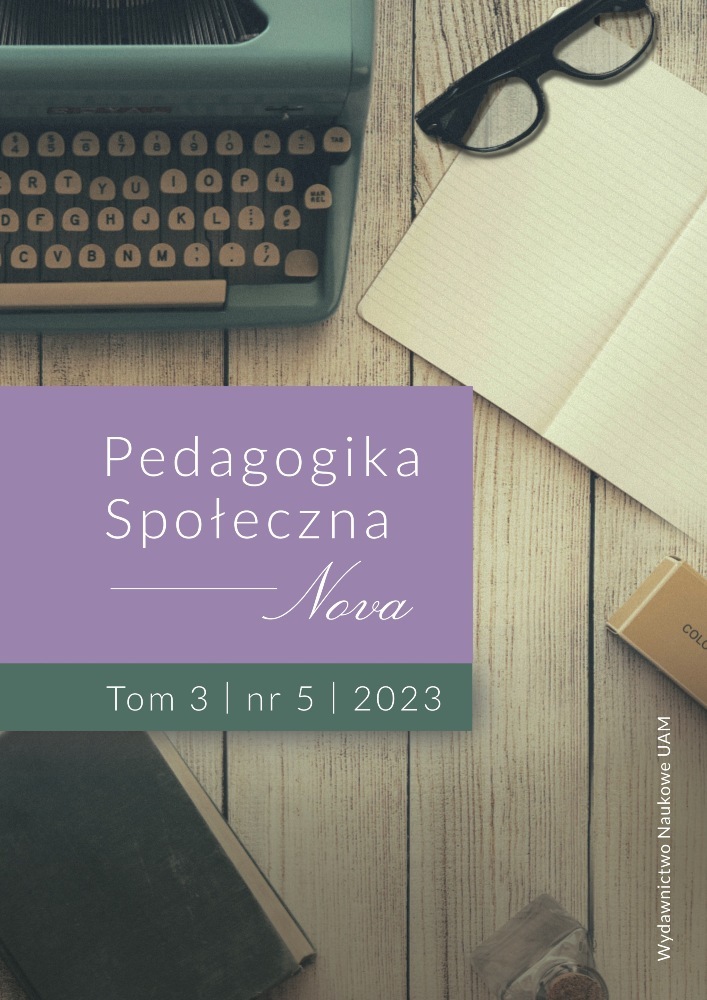Abstrakt
Celem artykułu jest próba rekonstrukcji współczesnej debaty wokół kształtowania patriotyzmu w ramach szkolnej edukacji obywatelskiej w Anglii. Podjęta została także próba ukazania, że tożsamość narodowa, jak i obywatelstwo, stanowią nie tylko zmienną konstrukcję społeczną, ale są też uzależnione od prowadzonej polityki, czy też stają się przedmiotem politycznej gry o władzę. Ukazano, że patriotyzm w angielskiej szkole – w zależności od orientacji politycznej – ulega rozproszeniu lub krystalizacji.
Bibliografia
Archard D., Should we teach patriotism?, „Studies in Philosophy and Education” 1999, 18, s. 157–173. DOI: https://doi.org/10.1023/A:1005138406380
Ariely G., Evaluations of patriotism across countries, groups, and policy domains, „Journal of Ethnic and Migration Study” 2009, 44(3), s. 462–481. DOI: https://doi.org/10.1080/1369183X.2017.1319761
Bailey G., Britons afraid to show national pride in public for fear of ridicule or abuse, poll finds, „Independent” 2018, 19 kwietnia, https://www.independent.co.uk/news/uk/home-news/patriotism-uk-na-tional-pride-ridicule-abuse-racism-xenophobia-prejudice-a8312786.html [dostęp: 12.12.2022].
Banks J.A. i in., Democracy and diversity: principles and concepts for educating citizens in a global age,Seattle 2005.
Berger P.L., Luckmann T., Społeczne tworzenie rzeczywistości, Warszawa 1983.
Brett P., Identity and Diversity: Citizenship Education and looking forwards from the Ajegbo Report,2007, http://www.citized.info/pdf/commarticles/Peter%20Brett%20%20Identity%20and%20Diversity.pdf [dostęp: 21.03.2019].
Budyta-Budzyńska M., Socjologia narodu i konfliktów etnicznych, Warszawa 2010.
Callan E., Creating citizens, Oxford 1997. DOI: https://doi.org/10.1093/0198292589.001.0001
Coman J., Proud to be English: How we can shape a progressive patriotism, „The Guardian”, http://www.theguardian.com/politics/2021/jan/17/proud-to-be-english-how-we-can-shape-a-pro-gressive-patriotism [dostęp: 12.12.2022].
Commission for Racial Equality, Citizenship and belonging: what is Britishness?, London 2005. Crowley M., In defence of patriotism, „Spiked” 2019, 20 grudnia, https://www.spiked-online.com/2019/12/20/in-defence-of-patriotism/ [dostęp: 12.12.2022]. DOI: https://doi.org/10.2307/j.ctvh9vw95.20
Dahlgreen W., Patriotism in Britain reduces with each generation, YouGov, https://yougov.co.uk/to-pics/politics/articles-reports/2015/07/14/decline-british-patriotism [dostęp: 12.12.2022].
Davies I., Chong E.K.M., Current challenges for citizenship education in England, „Asian Education and Development Studies” 2016, 5(1), s. 20–36. DOI: https://doi.org/10.1108/AEDS-05-2015-0015
Deutsch K., Nationalism and social communication: an inquiry into the foundations of nationality, London 1953.
Education for citizenship and teaching democracy in schools, Final Report of the Advisory Group of Citizenship, 22 September 1998.
Encyclopedia Britannica, https://www.britannica.com/topic/nationalism [dostęp: 10.11.2019].
Encyklopedia PWN, https://encyklopedia.pwn.pl/haslo/nacjonalizm;394 5094.html [dostęp: 10.11.2019].
English patriotism on the rise, research shows, „The Guardian”, https://www.theguardian.com/politics/2017/jan/10/english-patriotism-on-the-rise-research-shows [dostęp: 12.12.2022].
Gove M., All pupils will learn our island story, Speech to Conservative Party, October 5th 2010, http://conservativespeeches.sayit.mysociety.org/speech/601441 [dostęp: 29.09.2019].
Gove M., Conservative party conference speech (7 October 2009), podaję za: „Impact. Philosophical Perspectives on Education Policy” 2011, (19), s. 8.
Hand M., Patriotism in schools, „Impact Philosophical Perspectives on Education Policy” 2011, (19), s. 1–40. DOI: https://doi.org/10.1111/j.2048-416X.2011.00001.x
Hand M., Pearce J., Patriotism in British schools: principles, practices and press hysteria, [w:] B. Haynes (red.), Patriotism and citizenship education, Oxford 2009. DOI: https://doi.org/10.1111/j.1469-5812.2009.00528.x
Hejwosz-Gromkowska D., Edukacja obywatelska we współczesnej Anglii. Studium socjopedagogiczne, Poznań 2019. DOI: https://doi.org/10.14746/amup.9788323236993
Kateb G., Is patriotism a mistake?, „Social Research” 2000, 67, s. 901–924.
Keller S., Patriotism as bad faith, „Ethics” 2005, 115(3), s. 563–592. DOI: https://doi.org/10.1086/428458
Kerr D., Smith A., Twine C., Citizenship education in the United Kingdom, [w:] J. Arthur, I. Davies, C. Hahn (red.), Education for citizenship and democracy, London 2008, s. 252–262. DOI: https://doi.org/10.4135/9781849200486.n20
Kiwan D., Kiwan N., Citizenship education: the French and English experience, [w:] C. Pole, J. Pilcher, J. Williams (red.), Young people in transition. Becoming citizens?, London 2005, s. 136–158. DOI: https://doi.org/10.1057/9780230597778_8
Kohn H., The idea of nationalism, New York 1967.
Kuczur T., Ethnos i polities. Naród a społeczeństwo obywatelskie we współczesnej Europie, Toruń 2008.
Kumar K., Empire and English nationalism, „Nations and Nationalism” 2006, 12(1), s. 1–13. DOI: https://doi.org/10.1111/j.1469-8129.2006.00227.x
Kumar K., Nation and empire: English and British national identity in comparative perspective, „Theory and Society” 2000, 29, s. 575–608. DOI: https://doi.org/10.1023/A:1026550830748
Kumar K., The making of English national Identity, Cambridge 2003. DOI: https://doi.org/10.1017/CBO9780511550058
Layton-Henry Z., Citizenship and nationality in Britain, [w:] Z. Layton-Henry, C. Wilpert (red.), Challenging racism in Britain and Germany, London 2003, s. 60–77. DOI: https://doi.org/10.1057/9780230506206_4
Mattei P., Broeks M., From multiculturalism to civic integration: citizenship education and integration policies in the Netherlands and England since 2000s, „Ethnicities”, 18(1), s. 23–42. DOI: https://doi.org/10.1177/1468796816676845
McGhee D., The end of multiculturalism. Terrorism, integration and human rights, Maidenhead 2008.
Melosik Z., Wychowanie obywatelskie: nowoczesność, ponowoczesność. (Próba konfrontacji), [w:] Z. Melosik, K. Przyszczypkowski (red.), Wychowanie obywatelskie. Studium teoretyczne, porównawcze i empiryczne, Poznań–Toruń 1998, s. 35–56.
Merriam-Webster Dictionary, https://www.merriam-webster.com/dictionary/nationalism [dostęp: 10.11.2019].
Modrzewski J., Socjopedagogika, Poznań 2016. DOI: https://doi.org/10.21858/msr.19.05
Newman G., The rise of English nationalism: a cultural history, 1720–1830, New York 1987.
Nikitorowicz J., Tolerancja i patriotyzm w edukacyjnym procesie kształtowania społeczeństwa obywatelskiego, „Pedagogika Społeczna” 2019, 3(73), s. 177–200.
Nussbaum M., Patriotism and cosmopolitanism, [w:] J. Cohen (red.), For love of country, Boston 1996, s. 3–17.
Osler A., Citizenship education, democracy and racial justice 10 years on, „Race Equality Teaching” 2009, 27(3), s. 21–27. DOI: https://doi.org/10.18546/RET.27.3.05
Owen D., Future identities: changing identities in the UK – the next 10 years, London 2013.
Park A., Bryson C., Curtice J., British Social Attitudes 31, NatCen, London 2014, http://www.bsa.natcen.ac.uk/media/38893/bsa31_full_report.pdf [dostęp: 20.04.2020].
Peterson A., Civic patriotism as a legitimate aim of education for citizenship in England, „CitizenshipTeaching & Learning” 2012, 8(1), s. 5–20. DOI: https://doi.org/10.1386/ctl.8.1.5_1
Sales R., What is ‘Britishness’, and is it important?, [w:] G. Calder, D. Cole, J. Seglow (red.), Citizenship acquisition and national belonging, London 2010, s. 123–140. DOI: https://doi.org/10.1057/9780230246775_8
Soutphommasane T., Reclaiming patriotism, Cambridge 2009. DOI: https://doi.org/10.1017/CBO9780511691607
The British Academy, English identity and the governance of England, London 2017, s. 4, https://www.britac.ac.uk/governing-england-devolution-and-identity [dostęp: 8.06.2019].
Ward P., The end of Britishness? A historical perspective, „British Politics Review” 2009, 4(3), s. 3.
Żukiewicz A., „My a wy” – transgeneracyjne przesłanie publicystyki patriotycznej w pokoleniu historycznym Heleny Radlińskiej, „Nauki o Wychowaniu” 2022, 2(15), s. 91–106. DOI: https://doi.org/10.18778/2450-4491.15.06
Licencja
Prawa autorskie (c) 2023 Daria Hejwosz- Gromkowska

Utwór dostępny jest na licencji Creative Commons Uznanie autorstwa – Użycie niekomercyjne – Bez utworów zależnych 4.0 Międzynarodowe.

